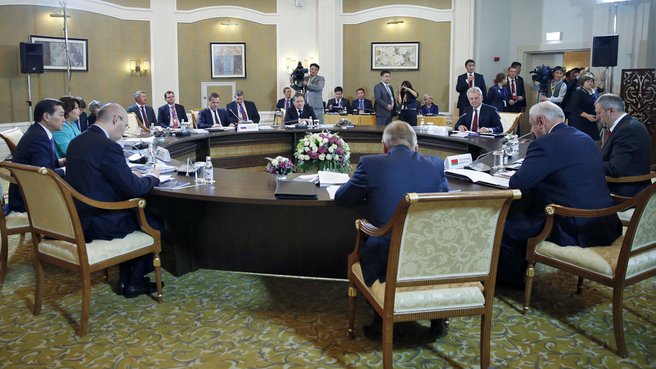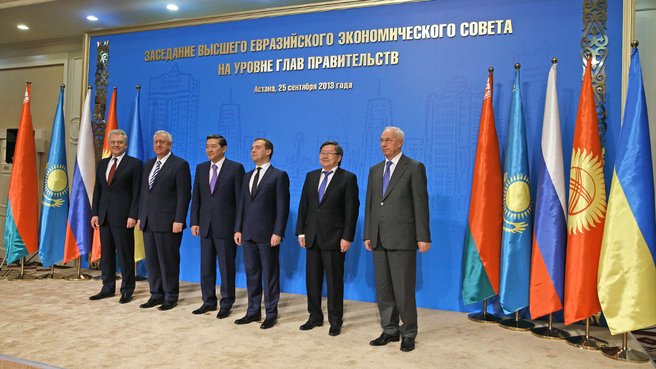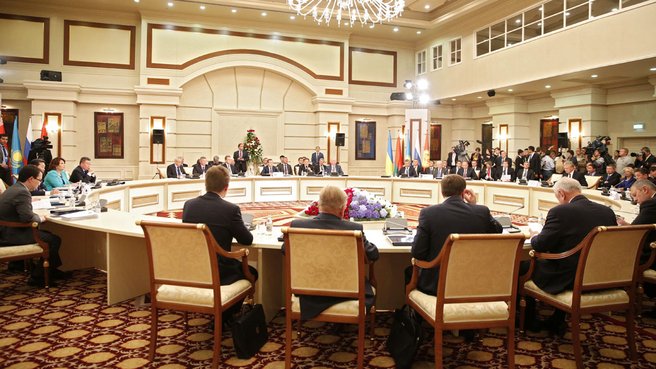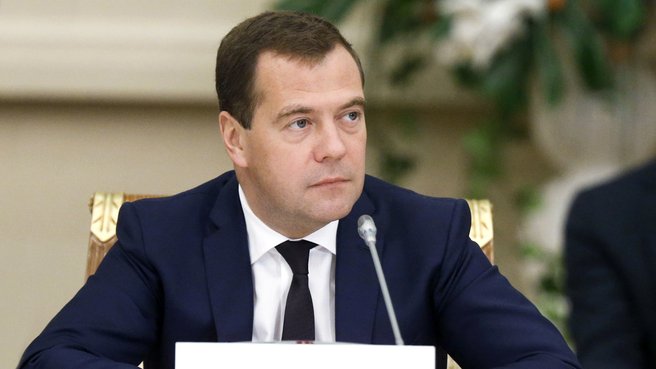Limited attendance meeting of the Supreme Eurasian Economic Council at heads of government level
Transcript:
Question: Could you tell us about your talks with Mr Azarov (Mykola Azarov, the Prime Minister of Ukraine). Have you achieved rapprochement? You have presented Ukraine with an ultimatum on several occasions, saying that its potential integration with the EU would close the door on the Customs Union. Why have you opted for this tough stand with regards to Ukraine? What are your thoughts on Mr Myasnikovich’s (Mikhail Myasnikovich, the Prime Minister of Belarus) statement to the effect that no one needs unfounded assertions and that a more pragmatic attitude towards Ukraine would be a better choice? Thank you.
Dmitry Medvedev: It was not an ultimatum at all. We are glad that observer countries – Ukraine and Kyrgyzstan – attended the Supreme Eurasian Economic Council meeting today. They took part in an enlarged session where they presented their ideas. This is very good. As for our estimation of the stage of Ukraine’s integration [with the EU], Russia has a simple view of it: as soon as Ukraine signs the Association Agreement with the EU, it will lose the possibility of full-scale participation in the Customs Union de jure and de facto. It can keep its observer status, however.
This is why we have told our [Ukrainian] colleagues more than once that they must weigh up all pros and cons and decide what is better and more interesting for the Ukrainian people. As far as I know, our Ukrainian partners have made their choice. The Ukrainian government has adopted a decision on association, public discussions have been held, and the Ukrainian president said they are willing to integrate into the Customs Union to a degree that will not contradict their associate EU membership.
This is a legally correct phrase indicating that Ukraine can only join the Customs Union in as much as it does not contradict their agreement with the EU. By saying so, Ukraine has clearly outlined its stance. The trouble is that the association agreement actually rules out Customs Union membership. We have compared [the two organisations] and have established that there are a number of reasons preventing simultaneous membership. It is virtually impossible.
We can hold talks, of course, and we will do so, but not on full-scale membership, whereas our Ukrainian partners sometimes say they would be willing to sign one agreement [with the Customs Union]. Should we rejoice? You don’t need observer status to sign just one agreement. This can be easily done using some other, alternative form of cooperation.
The signing of the association agreement with the EU will not be a disaster. We will continue our cooperation. Ukraine is a very large trade partner. I’m afraid, though, that our trade and other forms of economic cooperation will decrease, because Ukraine will be bound by the terms of its special relationship with the EU. It will most likely import considerable amounts of European goods, which will saturate the Ukrainian market and will ultimately find their way to the Russian market.
We will not sit on our hands in this case, which is why we will have to apply the provisions of Appendix 6 to the CIS Free Trade Area (CISFTA) agreement, which both Russia and Ukraine have signed, which stipulates the use of protective measures in case of economic threat. Of course, the decision will be taken with due regard of the situation. We have informed our Ukrainian colleagues about this very openly, as partners should, and I have repeated this to my colleague, Prime Minister Azarov, today.
So judging by the choice our partners have made, they should start preparing for a difficult time in our trade relations. I’d like to say again that this does not mean that everything will be extremely negative. Rather to the contrary – we will keep working together and we will continue our cooperation, but they [our partners] should be aware of this. I believe that Ukrainian people should know this too, but I cannot force my opinion on the leaders of a sovereign nation.
Question: Is it possible to clarify something? You say that Ukraine is signing only one agreement [with the Customs Union] while Mr Azarov claims that Ukraine is ready to sign up for 70 provisions. Is this so?
Dmitry Medvedev: I don’t know if they will sign 70 agreements – there are, in fact, around 80 of them in all – this would amount to full-scale membership. We would be happy. However, there is a provision in the associate membership agreement which reads that such decisions must be coordinated with Brussels. I don’t think that our EU colleagues will treat this lightly because of the clash between quite a few of the two unions’ rules.
Speaking about observer status, this is a good thing, but there is a tangible difference: Kyrgyzstan is using its observer status as a stage in the process of accession, as it has said openly. It may not be ready yet, due to economic difficulties and other problems, but it is willing to sign a roadmap and to move towards accession. But our Ukrainian partners are using this status just for the sake of observing what we do and so the impression is that they are trying to sit on the fence – at least for now. We will certainly be glad if the situation changes.
Some other countries have tried to develop special relations with the Customs Union. You know that Armenia has filed an application and other countries are expected to apply. Anyway, I’d like to say that these decisions can only be made by the Customs Union’s economic authorities, including the heads of state, within the framework of approved procedures, openly and with due regard to reality and opportunities. There can be no other agreements, as we have agreed with our partners – Belarus and Kazakhstan – today.
Question: Mr Medvedev, Maxim Tovkailo from Vedomosti newspaper. The agreements on compensation to Russia for the duty free supply of oil and petrochemicals to Belarus and Kazakhstan will expire on December 31. However, the Government’s draft budget for the next three years has a provision on planned revenue from this compensation, which means that it hoped for the extension of these agreements. Did you agree on the extension during this meeting? Is it true that Kazakhstan is not happy about this provision, and that it has been proposed that these duties be paid by state-owned Rosneft?
Dmitry Medvedev: This is a difficult question, but it mostly concerns our relations with Kazakhstan rather than the Customs Union. We did not discuss this issue on the Customs Union platform but during bilateral talks with Prime Minister Serik Akhmetov. We have agreed to continue our consultations. No decision has been reached yet, and I will even have to hold a meeting on this issue with the heads of all Russian departments, Rosneft and several other agencies before we resume consultations with Kazakhstan. We have reason to hold certain views of budget revenues, as you said, but we must also honour the Customs Union rules and principles. We need to take all of this into account when making the final decision.
Question: Is Belarus willing to sign such an agreement?
Dmitry Medvedev: We have had no problems with Belarus in this respect, but we do have things to discuss with it, which we will do at separate talks. Thank you, colleagues, and all the best.
















